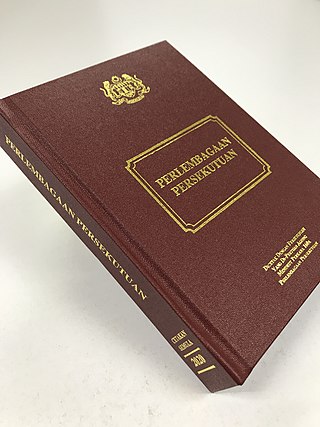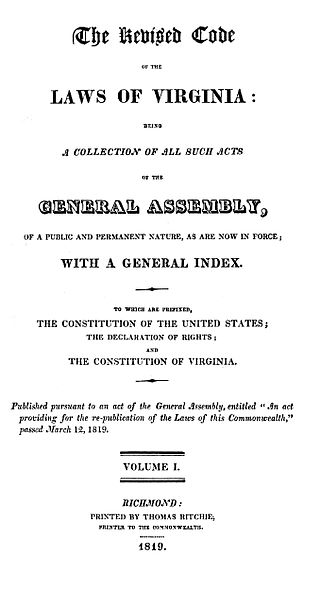A criminal code or penal code is a document that compiles all, or a significant amount of, a particular jurisdiction's criminal law. Typically a criminal code will contain offences that are recognised in the jurisdiction, penalties that might be imposed for these offences, and some general provisions.

The Federal Constitution of Malaysia, which came into force in 1957 as the Constitution of the Federation of Malaya and was amended in 1963 to form the Constitution of Malaysia, is the supreme law of Malaysia and contains a total of 183 articles. It is a written legal document influenced by two previous documents, the Federation of Malaya Agreement 1948 and the Independence Constitution of 1957. The Federation was initially called the Federation of Malaya and it adopted its present name, Malaysia, when the states of Sabah, Sarawak and Singapore became part of the Federation. The Constitution establishes the Federation as a constitutional monarchy, having the Yang di-Pertuan Agong as the Head of State with largely ceremonial roles. It provides for the establishment and organisation of three main branches of the government: the bicameral legislative branch called the Parliament, which consists of the House of Representatives and the Senate ; the executive branch led by the Prime Minister and his Cabinet Ministers and the judicial branch headed by the Federal Court.

The legal system of Singapore is based on the English common law system. Major areas of law – particularly administrative law, contract law, equity and trust law, property law and tort law – are largely judge-made, though certain aspects have now been modified to some extent by statutes. However, other areas of law, such as criminal law, company law and family law, are largely statutory in nature.
The Internal Security Act 1960 was a preventive detention law in force in Malaysia. The legislation was enacted after the Federation of Malaya gained independence from Britain in 1957. The ISA allows for detention without trial or criminal charges under limited, legally defined circumstances. On 15 September 2011, the Prime Minister of Malaysia, Najib Razak said that this legislation will be repealed and replaced by two new laws. The ISA was replaced and repealed by the Security Offences Act 2012 which has been passed by Parliament and given the royal assent on 18 June 2012. The Act came into force on 31 July 2012.

The Code of Virginia is the statutory law of the U.S. state of Virginia and consists of the codified legislation of the Virginia General Assembly. The 1950 Code of Virginia is the revision currently in force. The previous official versions were the Codes of 1819, 1849, 1887, and 1919, though other compilations had been printed privately as early as 1733, and other editions have been issued that were not designated full revisions of the code.

The Piracy Act 1698 was an Act of the Parliament of England passed in the eleventh year of King William III. The main purpose behind the statute was to make some corrections to the Offences at Sea Act 1536.
The Revised Statutes of the United States was the first official codification of the Acts of Congress. It was enacted into law in 1874. The purpose of the Revised Statutes was to make it easier to research federal law without needing to consult the individual Acts of Congress published in the United States Statutes at Large.

There are three general sources of Singapore law: legislation, judicial precedents, and custom.
The Ministry of Law and Justice in the Government of India is a cabinet ministry which deals with the management of the legal affairs, legislative activities and administration of justice in India through its three departments namely the Legislative Department and the Department of Legal Affairs and the Department of Justice respectively. The Department of Legal Affairs is concerned with advising the various Ministries of the Central Government while the Legislative Department is concerned with drafting of principal legislation for the Central Government. The ministry is headed by Cabinet Minister of Law and Justice Arjun Ram Meghwal appointed by the President of India on the recommendation of the Prime Minister of India. The first Law and Justice minister of independent India was Dr. B. R. Ambedkar, who served in the Prime Minister Jawaharlal Nehru's cabinet during 1947–51.

The Criminal Law Act 1967 is an act of the Parliament of the United Kingdom that made some major changes to English criminal law, as part of wider liberal reforms by the Labour government elected in 1966. Most of it is still in force.
Statute Law Revision Act is a stock short title which has been used in Antigua, Australia, Barbados, Bermuda, Canada, Ghana, the Republic of Ireland, South Africa and the United Kingdom, for Acts with the purpose of statute law revision. Such Acts normally repealed legislation which was expired, spent, repealed in general terms, virtually repealed, superseded, obsolete or unnecessary. In the United Kingdom, Statute Law (Repeals) Acts are now passed instead. "Statute Law Revision Acts" may collectively refer to enactments with this short title.

The Piracy Act 1850, sometimes called the Pirates Repeal Act 1850, is an Act of the Parliament of the United Kingdom. It relates to proceedings for the condemnation of ships and other things taken from pirates and creates an offence of perjury in such proceedings.

Reginald Hugh Hickling, CMG, QC, known as Hugh Hickling, was a British lawyer, civil servant, law academic, and author, and author of the controversial Internal Security Act of colonial Malaysia.
Statute law revision may refer to the printing of, or the editorial process of preparing, a revised edition of the statutes, or to the process of repealing obsolete enactments to facilitate the preparation of such an edition, or to facilitate the consolidation of enactments.
A revised edition of the statutes is an edition of the Revised Statutes in the United Kingdom. These editions are published by authority.

The Electricity (Supply) Act 1919 was an Act of the Parliament of the United Kingdom which amended the law with respect to the supply of electricity. It established the statutory body of the Electricity Commissioners ‘to promote, regulate and supervise the supply of electricity’ under the direction of the Board of Trade. It provided for the formation of electricity districts and, where necessary, the establishment of joint electricity authorities, ‘to provide or secure the provision of a cheap and abundant supply of electricity’.
The Interpretation Acts 1948 and 1967 is a Malaysian law which enacted to provide for the commencement, application, construction, interpretation and operation of written laws; to provide for matters in relation to the exercise of statutory powers and duties; and for matters connected therewith.

The Ecclesiastical Commissioners Act 1847, sometimes called the Bishopric of Manchester Act 1847, is an Act of the Parliament of the United Kingdom with the principal purpose of delegating to the Ecclesiastical Commissioners for England the power to put forward a scheme to create the Diocese of Manchester. The Ecclesiastical Commissioners scheme containing the precise arrangements for the diocesan changes was put forward to Queen Victoria at Osborne House in the Isle of Wight, on 10 August 1847, where it was assented to in Chambers.

The Electricity (Supply) Act 1926 was an Act of the Parliament of the United Kingdom which amended the law on the supply of electricity. Its long title is: ‘An Act to amend the law with respect to the supply of electricity’. This Act was construed as one with the Electricity (Supply) Acts 1882 to 1922, and was cited as the Electricity (Supply) Acts 1882 to 1926. It established a statutory body, the Central Electricity Board (CEB), ‘with the duty of supplying electricity to authorised undertakers’ and to ‘appoint consultative technical committees’. It provided for the Electricity Commissioners to prepare and transmit to the CEB ‘electricity schemes’ for relevant areas, and which identified the most efficient ‘selected’ generating stations which were to be used to generate electricity for the Board. The Act provided for ‘main transmission line’ interconnections between selected stations and undertakings; and to standardise the frequency of generation; and other purposes. The provisions of the Act enabled the construction of the National Grid.

The National Emblems Act 1949 is a Malaysian law that regulates the public display of foreign national emblems, including flags, banners, and images of national or political leaders from foreign states. The Act sets requirements for public displays of such emblems, specifically in public spaces and schools, and details enforcement measures and penalties for unauthorized displays. It applies throughout Malaysia, including the states of Sabah and Sarawak, and grants police officers authority to enforce compliance through warrantless arrests under certain conditions.











